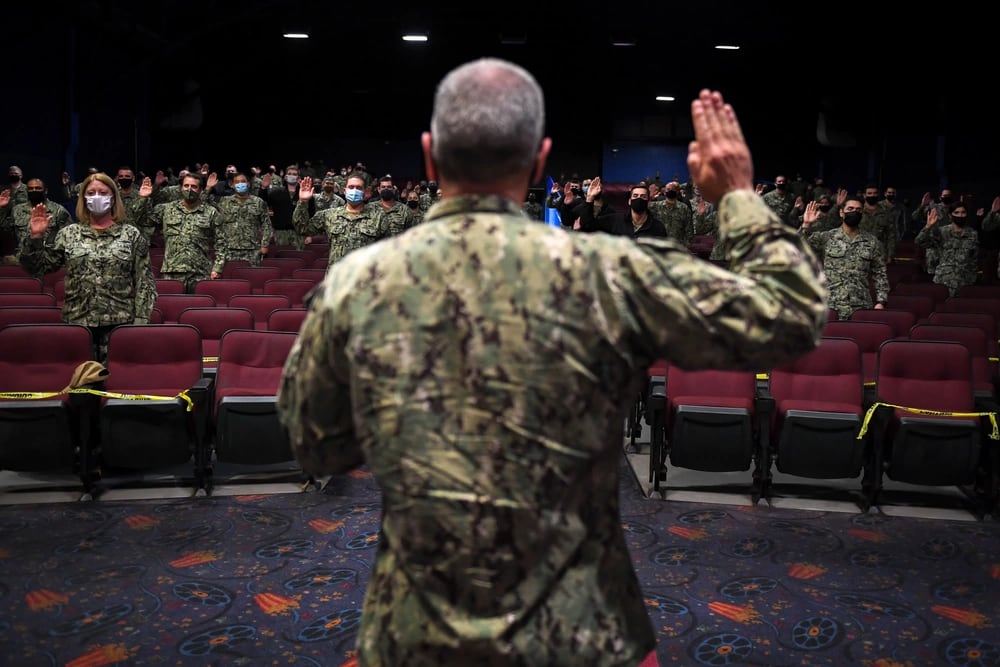Members of Congress said they are looking for ways to prevent members of extremist groups from joining the military and booting troops with ties to violent ideology, but will wait on new action to see how the new Pentagon leadership deals with the issue.
“I think [Defense Secretary] Lloyd Austin needs to be given his shot to do that cleanup work,” said Rep. Elissa Slotkin, D-Mich., who will serve as chairwoman of the House Homeland Security Committee’s panel on domestic terrorism issues.
“I really believe in keeping things inside the chain of command, unless it’s not working, and I just don’t think we’re at that point on the issue of domestic terrorism and white supremacy yet.”
On Wednesday, Austin announced plans for a 60-day stand-down across the military to address the issue of extremism among military service members. Pentagon spokesman John Kirby told reporters that although leaders believe the number of troops involved in such groups is small, “no matter what it is, it is not an insignificant problem.”
RELATED

A New York Times analysis released Thursday showed at least 22 individuals charged with federal crimes related to the Jan. 6 attack were current or former military personnel. In addition, Air Force veteran Ashli Babbitt was shot to death by Capitol Hill police trying to force her way onto the House chamber floor in a bid to reach lawmakers.
In a meeting with reporters on Thursday, Slotkin outlined a host of plans by committee officials and other members of Congress to deal with the issue of extremism in America today, which gained enhanced public attention after the violent attack on the Capitol building on Jan. 6 by supporters of former President Donald Trump upset with the results of November’s election.
Those ideas include a possible independent commission to review intelligence and operations mistakes leading up to the attack, the role of social media in allowing extremist groups to organize, and better recognition of signs of domestic terrorism before violence occurs.
But for now, she said, plans to intervene in the military’s response are on hold. Earlier in the day, during a full House Homeland Security Committee hearing on the issue, outside experts said lawmakers must examine the role of military and law enforcement involvement in fringe groups to fully address the issue.
“A small but disproportionately impactful segment of the mob used military tactics to organize and manage the successful advance into and throughout the Capitol,” said Christopher Rodriguez, director of the District of Columbia’s Homeland Security and Emergency Management Agency,
“FBI investigations that have been made public have reported that some of these individuals had military backgrounds and participated in military-style training camps prior to traveling here to Washington, D.C. … We need to prioritize insider threat programs in the military and law enforcement to ensure that specific skill sets which are developed to defend the community are not being turned on the very people they are meant to protect.”
Elizabeth Neumann, former assistant secretary for counterterrorism at the Department of Homeland Security, said that the military connection of some extremists may come as a shock to the general public, but it shouldn’t.
“This has been a known challenge for decades,” she told lawmakers.
“We know that white supremacist groups and militia groups target military and former military and former law enforcement for recruitment purposes. We also know that they encourage people they’ve recruited into these movements to stay clean, so that they can enter into and not get caught by screening mechanisms in place for the military and law enforcement.”
RELATED

Brian Jenkins, senior advisor at the Rand Corporation, said that defense officials have shown the ability to deal with these kinds of problems in the past.
“The military over the years has repeatedly been tasked to address the issue of political displays and political loyalties and things that interfere with the unity of effort,” he told lawmakers. “They have experience in doing it, and they can do it [with extremism] too.”
Committee members said they expect that to happen. Slotkin said she’ll expect quick progress on the issue from defense officials in coming months, or else she’ll push for congressional intervention.
The department is already mandated to collect data on extremist activity and views among troops this year per previous action from lawmakers. Austin is expected in coming days to issue guidance on results from leadership and individual commands on the topic at the end of the 60-day stand-down.
Pentagon Bureau Chief Meghann Myers contributed to this report.
Leo covers Congress, Veterans Affairs and the White House for Military Times. He has covered Washington, D.C. since 2004, focusing on military personnel and veterans policies. His work has earned numerous honors, including a 2009 Polk award, a 2010 National Headliner Award, the IAVA Leadership in Journalism award and the VFW News Media award.









